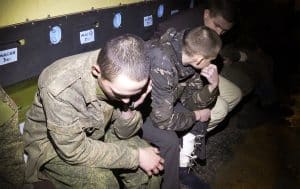Russian War Soldiers Struggle with Substance Abuse
The ongoing Russian war in Ukraine, sparked by Russia’s annexation of Crimea in 2014 and escalating into open warfare in 2022, has brought to light myriad psychological and social implications for soldiers involved in this protracted and arduous engagement. Among these implications, substance abuse has emerged as a particularly concerning phenomenon that exacerbates an already fragile situation for military personnel. The heightened stressors experienced by soldiers, coupled with the socio-cultural landscape in which they operate, contribute to a burgeoning crisis of substance abuse that requires critical examination.
The psychological burden borne by soldiers engaged in warfare is profound. Combat exposes individuals to traumatic experiences, whether through the loss of comrades, the infliction of violence upon others, or attempted survival in unimaginable conditions. The Russian troops, often operating in urban environments fraught with both combat and civilian distress, face acute levels of anxiety, depression, and post-traumatic stress disorder (PTSD). Reports from various frontline engagements indicate that these psychological impacts manifest not only in emotional turmoil but also in maladaptive coping mechanisms such as substance use. Substances like alcohol, marijuana, and more dangerous narcotics become readily available in conflict zones, positioning them as maladaptive yet immediate relievers of stress and anxiety for the soldiers.
Alcohol consumption has a long-standing tradition within military culture. It serves both as a social lubricant and as a means to combat the horrors of war. Within the context of the Russian military, alcohol is historically significant. Soviet-era narratives often celebrate alcohol as part of soldier camaraderie, which has permeated contemporary military practices. Nonetheless, the increased reliance on alcohol as a coping mechanism during the current conflict may lead to dependency and addiction, further deteriorating mental health and impairing operational readiness. Alcoholism in soldiers can spiral into a vicious cycle, where deteriorating mental health leads to increased substance use, potentially resulting in harmful behaviors that can exacerbate wartime trauma.
Furthermore, many soldiers of the Russian War have also reported the use of other illicit substances to cope with the physical and psychological demands of combat. The availability of drugs, some of which are accessible in conflict zones, can create a brutal feedback loop of addiction. As the war progresses, soldiers may turn to these substances in a desperate bid to escape their harsh realities, thus heightening the risk of substance use disorders. The normalization of drug use among close-knit military cohorts can further propagate this trend, leading to collective involvement in destructive behaviors that overshadow personal responsibility and exacerbate existing societal stigmas around substance abuse.
The potential for substance abuse extends beyond individual soldiers: it reverberates throughout the military infrastructure itself. Units grappling with high rates of substance abuse may experience diminished effectiveness, leading to operational failures and an inability to perform critical missions. Moreover, the leadership within the military can be torn between fostering a culture of resilience and lessening the stigma surrounding mental health while also demanding performance and discipline from troops. When soldiers rely on substances to cope, the cycle of trauma and combat effectiveness becomes an ethical concern for military leadership and society at large.
Additionally, the familial and social contexts of soldiers cannot be overlooked in the exploration of substance abuse. Soldiers returning home often encounter strained familial relationships due to the impact of their combat experience. As they attempt to reintegrate into civilian life, many struggle with stigmas associated with mental health and substance use, creating barriers to seeking treatment and support. This situation is exacerbated within a context that may not fully understand or empathize with the traumas of combat, leading soldiers to isolate and self-medicate rather than pursue help.
Common Substances of Abuse by Soldiers in the Russian War
The phenomenon of substance abuse among military personnel has long been a troubling issue, particularly during times of conflict. This concern is intensified in the context of the ongoing Russian War, including Ukraine and other former Soviet territories. Soldiers facing the stresses of war experience numerous psychophysical challenges, leading some to seek relief through the misuse of alcohol and drugs. This essay examines the common substances of abuse detected in Russian soldiers during these conflict periods, the underlying reasons for their use, and the broader implications for military efficacy and societal health.
One of the most prevalent substances abused by soldiers is alcohol. Drinking culture is deeply embedded in many post-Soviet societies, and its normalization can be seen as a coping mechanism for enduring the stresses of military life. In the context of war, alcohol often serves as a temporary escape from the psychological burden of combat—fear, anxiety, trauma, and moral conflict. Reports and testimonies suggest that soldiers have used alcohol to manage these burdens, attempting to numb the emotional pain associated with their experiences. Unfortunately, regular consumption of alcohol can lead to dependency, which in turn contributes to a myriad of social issues, including family breakdown and increased instances of aggression.
Another significant substance of concern is opioids, specifically synthetic variants such as fentanyl. The anxiety and physical pain that accompany combat situations can lead soldiers to self-medicate using opioids. In some instances, these drugs are obtained through illicit channels or from medical supplies intended to treat legitimate injuries on the battlefield. The rising availability of synthetic opioids has compounded the issue, leading to alarming addiction rates among soldiers. Given the potency of these drugs, misuse not only raises the risk of overdose but also detracts from overall unit cohesion and effectiveness, as addicted soldiers may struggle with physical and cognitive impairments.
Additionally, synthetic stimulants, particularly amphetamines, have emerged as substances of abuse among military personnel. Initially employed in military contexts to enhance endurance and combat effectiveness, the use of these stimulants has evolved into recreational abuse within the ranks. Combat situations often require prolonged alertness, and in the absence of adequate rest, soldiers may resort to stimulants that promise to alleviate fatigue. However, the repercussions of amphetamine use can be dire, including heightened aggression, paranoia, and long-term mental health complications. These consequences not only impede operational readiness but contribute to a culture of instability among troops.
The factors driving substance abuse in the Russian military context extend beyond the frontline experiences of soldiers to encompass broader societal issues. The sociocultural landscape in Russia is marked by a history of trauma, economic uncertainty, and limited access to mental health services. A prevailing stigma around seeking psychological help further exacerbates soldiers’ reluctance to address their issues openly. Consequently, many service members may turn to substances as a means to cope, given the absence of structural support for mental health and substance use disorders.
The implications of substance abuse among soldiers are profound, impacting not only individual soldiers but also overall military effectiveness and national security. Units impaired by addiction are likely to experience increased incidents of misconduct, diminished combat readiness, and heightened risks of accidents, all of which can have cascading effects on mission outcomes. Furthermore, substance abuse leaves lasting scars on soldiers’ mental health, often contributing to post-traumatic stress disorder (PTSD) and depressive disorders, which further complicates their reintegration into civilian life post-service.
Addressing this issue necessitates a multi-faceted approach that includes raising awareness of the risks associated with substance abuse, improving access to mental health care, providing support for those in need, and fostering an environment where seeking help is viewed as a sign of strength rather than weakness. The Russian military, alongside non-governmental organizations, must prioritize comprehensive substance abuse and mental health programs to mitigate the long-term effects of these societal challenges.
The prevalence of substance abuse among soldiers of the Russian War is a multifaceted problem rooted in both individual and societal dimensions. Alcohol, opioids, and stimulants represent the most commonly abused substances via complex interactions of war-related stressors and cultural attitudes toward substance use. The ramifications of this crisis extend beyond the battlefield, affecting not only military effectiveness but also the health and wellbeing of soldiers as they transition back to civilian life. A concerted effort to address these issues is essential for protecting the lives and integrity of those who serve.
Resources Available to Treat Soldiers of the Russian War Struggling with Substance Abuse
Substance abuse among military personnel has emerged as a critical issue, particularly in contexts of prolonged conflict and high-stress environments. The Russian War, where the military has been engaged in various international operations, the incidence of substance use disorders among soldiers warrants significant attention. Addressing this challenge effectively is vital not only for the wellbeing of the soldiers but also for the operational integrity of the military. Various resources have been developed or adapted within Russia to confront this pressing issue, ranging from medical interventions to psychological support and rehabilitation programs.
Medical and Therapeutic Resources
A foundational aspect of addressing substance abuse is the provision of medical care. The Russian military has established several medical units designed to treat soldiers with substance use disorders. These units often comprise psychiatrists, psychologists, and addiction specialists equipped to administer pharmacotherapy and behavioral therapies. The use of medications such as methadone or buprenorphine for opioid dependence, as well as disulfiram for alcohol dependency, reflects a dual approach targeting both the physiological and psychological aspects of addiction.
In recent years, initiatives have been undertaken to enhance the training of military healthcare providers. This training is crucial for early identification of substance abuse and providing immediate intervention. Military doctors receive education on recognizing the signs of addiction, understanding the psychological factors that contribute to substance abuse, and employing various therapeutic modalities. Continuous professional development ensures that military healthcare providers remain updated with best practices in addiction treatment.
Psychological Support Systems
Understanding the psychological complexities that accompany substance abuse is vital for effective intervention. The stressors faced by military personnel, including combat exposure, loss, and trauma, often drive individuals to seek solace in substances. The Russian military has recognized the importance of psychological support systems to mitigate these mental health challenges.
Counseling services have been expanded within military infrastructure, enabling soldiers to access psychological support confidentially. Group therapy, individual counseling, and peer support groups are increasingly available. The establishment of hotlines for psychological support has further facilitated immediate assistance, enabling soldiers to seek help without fear of stigma. Psychologists trained in trauma-informed care can validate the experiences of soldiers, thereby reducing the likelihood of turning to substances as a coping mechanism.
Rehabilitation Programs
Once a soldier is diagnosed with a substance use disorder, a comprehensive rehabilitation program is crucial for their recovery. In Russia, rehabilitation programs specifically tailored for military personnel have been crafted, focusing on holistic treatment strategies. These programs often encompass various therapeutic modalities, including cognitive-behavioral therapy (CBT), motivational interviewing, and relapse prevention strategies. Such multifaceted approaches are crucial in addressing the underlying issues of addiction while empowering soldiers to develop coping mechanisms that do not involve substance use.
Rehabilitation programs also emphasize the importance of social reintegration. Transitioning back to civilian life can present its challenges, especially for those with a history of substance abuse. Programs often entail vocational training to provide soldiers with skills and resources necessary for employment post-service, thereby reducing the likelihood of relapse attributed to socioeconomic factors. Partnerships with civilian organizations further enhance the efficacy of rehabilitation efforts, providing soldiers with continued support post-discharge.
Community and Family Involvement
The involvement of family and community is paramount in the recovery journey of soldiers grappling with substance abuse. Recognizing this, the Russian military has initiated family therapy programs, which aim to engage the soldiers’ families in the healing process. Such programs help to foster understanding and support within familial structures, offering loved ones the tools to assist in recovery and reduce enabling behaviors.
Community programs that provide education about substance abuse, recovery, and mental health can create a more supportive environment for recovering service members. Awareness campaigns are essential in mitigating stigma and encouraging soldiers to seek help without fear of reproach from peers or superiors.
The issue of substance abuse among the Russian War soldiers is being addressed through a combination of medical, psychological, rehabilitation, and community resources. By utilizing a multi-faceted approach, the Russian military is creating avenues of support for soldiers facing the challenges of addiction. As the military continues to engage in complex environments, sustained efforts in these areas will be vital in ensuring the health, welfare, and operational readiness of its personnel. Continued development and enhancement of these resources will further bolster the capacity to address substance abuse, ultimately fostering a culture of recovery and resilience among military members.
What Ambrosia Behavioral Health Offers for Soldiers Who Struggle with Substance Abuse

Veterans Trauma
One of the primary services offered by Ambrosia Behavioral Health is its specialized treatment programs aimed at addressing the complex interplay between trauma and substance abuse. Many service members experience post-traumatic stress disorder (PTSD), anxiety, or depression, which can lead to self-medication through drugs or alcohol. Recognizing this critical link, Ambrosia employs evidence-based therapies such as cognitive-behavioral therapy (CBT) and eye movement desensitization and reprocessing (EMDR) to help soldiers confront unresolved trauma and develop healthier coping mechanisms. These therapies are not only essential for substance abuse recovery, but they also promote overall mental well-being, facilitating a comprehensive approach to healing.
Community Healing
Furthermore, Ambrosia Behavioral Health recognizes the importance of a supportive community during the recovery process. Many soldiers experience a sense of isolation when transitioning from military to civilian life, further exacerbating feelings of loneliness and despair that can lead to substance abuse. Ambrosia addresses this by fostering a sense of camaraderie among participants. Group therapy sessions provide a safe space for soldiers to share their experiences, challenges, and successes in recovery with peers who can relate to their struggles. This mutual support helps to build resilience and reinforces the notion that recovery is not a solitary journey but rather a collective endeavor.
Holistic Care
In addition to traditional therapeutic methods, Ambrosia Behavioral Health offers holistic treatments designed to promote overall wellness. Recognizing the importance of physical health in the recovery process, the center provides activities such as yoga, meditation, and nutritional counseling. These holistic approaches encourage soldiers to reconnect with their bodies and minds, fostering a sense of balance and promoting healing from the inside out. Engaging in physical activities also serves as an alternative coping mechanism, steering individuals away from substance use while encouraging healthier lifestyle choices.
Family Involvement
Family involvement is another pillar of Ambrosia’s treatment philosophy. Substance abuse affects not only the individual but also their loved ones. Ambrosia actively encourages family participation in the recovery process by facilitating family therapy sessions. These sessions are designed to educate families about substance use disorders and the recovery journey while providing them with the tools to support their loved ones. By involving family members, Ambrosia helps to rebuild trust and communication, essential elements in fostering a healthy home environment conducive to lasting recovery.
Moreover, Ambrosia Behavioral Health places a strong emphasis on aftercare planning, recognizing that the transition from treatment back to everyday life is fraught with challenges. The center provides tailored aftercare programs that include ongoing counseling, support group participation, and resources for housing and employment. This continuity of care is crucial in preventing relapse, as soldiers can transition into their post-treatment lives with the knowledge that they have access to continued support. Such a structured aftercare system significantly enhances the likelihood of sustained sobriety and successful reintegration into society.
Ambrosia Behavioral Health also underscores the need for cultural competence in their treatment approaches. The military culture is characterized by unique values, norms, and experiences, and understanding these aspects is crucial for effective treatment. Ambrosia’s staff often includes professionals with military backgrounds or specific training in working with veterans, ensuring that soldiers feel understood and respected throughout their recovery journey. This cultural sensitivity enhances the therapeutic alliance and creates a safe environment where soldiers can openly discuss their struggles and challenges.
Ambrosia Behavioral Health stands as a beacon of hope for soldiers grappling with substance abuse. Through its multifaceted, comprehensive approach, the center addresses not only the symptoms of addiction but also the underlying issues often rooted in trauma and mental health disorders. By fostering a supportive community, incorporating holistic practices, emphasizing family involvement, and ensuring cultural sensitivity, Ambrosia empowers soldiers to reclaim their lives, achieve sobriety, and reintegrate into civilian life with renewed purpose and resilience. In doing so, Ambrosia Behavioral Health exemplifies a commitment to the well-being of those who have served, recognizing their sacrifices and striving to provide them with the support they deserve.
In Conclusion
In conclusion, the escalation of substance abuse among soldiers in the context of the Russian war underscores a critical human and social issue that warrants urgent attention. The interplay between combat stress, psychological trauma, and societal norms surrounding substance use creates an environment in which addiction can thrive. Addressing these challenges necessitates a multifaceted approach that integrates mental health support, drug rehabilitation efforts, and educational programs aimed at destigmatizing mental health issues within military culture. Ensuring that soldiers receive the comprehensive support they need is essential not only for their wellbeing but also for the overall efficacy and integrity of military operations in an ever-evolving conflict landscape.
Ambrosia stands at the cutting edge of adolescent mental health and addiction treatment. Since 2007 Ambrosia has been the nation’s leader in adult and adolescent behavioral healthcare maintaining a strong focus on neuroscience and research fueling their advanced treatment methods. If you or someone you know is struggling reach out today and we will provide you with exemplary customer service and a truly effective treatment experience.
Additional Resources:








